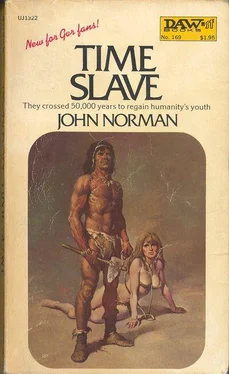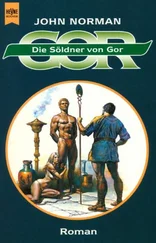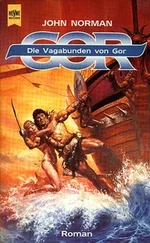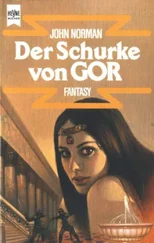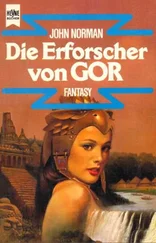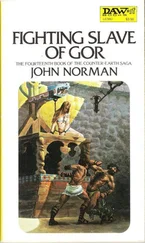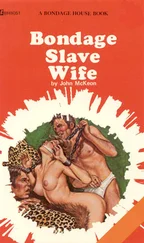“Yes?” said William, looking at Hamilton on the porch.
“What cage is gone?” begged Hamilton.
“The one we were using in the experiment,” said William, slowly, blankly.
“What does it mean?” begged Hamilton.
“It means, I think,” said William, smiling thinly, “that the Herjellsen conjecture is true.”
Hamilton stood silently on the porch.
“Good-night, Brenda,” said William.
“Good-night, William,” said Brenda Hamilton.
“Splendid!” cried Hamilton, delightedly.
She worked at the side of the men in the experimental shack.
In the past days she had felt herself a full member of the team, welcomed and respected. She was one with them. Herjellsen was gentle, perceptive, directive. William was helpful, amusing. Even Gunther was bearable, and seemed now, for the first time, to see her as a human being. He had even, once, called her “Brenda.”
The interior of the translation cubicle, seen through the heavy, clear, plastic walls, was beginning to glow, pulsating with a diffused, photic energy; this phenomenon, Herjellsen had explained, was a concomitant of the transference phenomenon, not a manifestation of the phenomenon per se; it was related to the phenomenon derivatively, not directly; it was like the waves that are displaced by the passage of an invisible ship, not the ship but the sign of its passage; yet the photic phenomenon, like turbulence in a medium, ‘in water or an atmosphere, signaled the presence of the force Herjellsen had called P.
Gunther’s eyes blazed, looking into the cubicle.
William touched Hamilton’s arm. “Do not be afraid now,” he whispered.
“I’m not!” cried Hamilton, happily. “It’s beginning, is it not?”
She looked to Herjellsen.
Herjellsen sat to one side, in a straight wooden chair, before a wooden table. To one side was the amplifying mechanism, wires running to it from the generator, and from the mechanism to the steel hood mounted on the table. Two cables, in a loop, passed from the hood to the cubicle and back, as though a self-reinforcing cycle might be established.
Under the hood Herjellsen’s head was down. His fists were clenched.
Suddenly, for no reason she understood, Brenda Hamilton was apprehensive.
Gunther and William were intent.
There is only one reality, had said Herjellsen, in its infinite modes and attributes.
“Spinoza thought something like that,” had remarked William earlier.
“Spinoza did not understand,” said Herjellsen. “It is neither God nor Nature. It is deeper than nature, and too deep and terrible to be God.”
“What is it?” had asked William.
“The reality,” had said Herjellsen.
“I do not understand,” had said William.
“The reality-and the power,” had said Herjellsen.
Hamilton shivered.
“And nature, and gods,” had said Herjellsen, “and spiders and stars are but its forms, the lion and the child, flowers and galaxies, perceptions, modes, diversities, transiencies, all!”
William had been silent. It was not wise to argue with Herjellsen at certain times, in certain moods. He was at most times eminently rational, pleasant, but when the mood was upon him, the frenzy of the conjecture, one did not speak with him.
“And,” Herjellsen had cried, “the reality-the power-is as much and wholly present in a blade of grass, in the petal of a flower, as in the furnace of Betelgeuse!” He had looked wildly at William, who had not met his eyes. “And that means,” had cried Herjellsen, “that here-in my hand-in my head-as much as anywhere, as full and perfect, lies the power. We, each of us, are the reality, the power.”
“I’m sorry,” had said William. “I’m sorry.”
“There are continuities!” had wept Herjellsen. “Continuities!” His voice had trembled. “You know of continuities between heat and light and sound, and between the particles of an apple and those of a stone, and between the fluid cell in an algae in the pristine sea and the brain of an Alexander, a Beethoven, an Einstein’’
“The relevance is obscure,” had said William, hesitantly.
“Time and space are modes of intuition,” had whispered Herjellsen. “Do they exist in their own right?”
“Yes,” had said William.
“How do you know?” asked Herjellsen.
“I perceive them,” said William.
“You have begged the question,” said Herjellsen.
“I do not know what space and time are in their own right,” said William.
“Do they pertain to things in themselves?” demanded Herjellsen.
“I do not know,” grumbled William. “Perhaps they do.”
“Yes,” said Herjellsen, “perhaps they do-but perhaps they do not.”
Gunther had not spoken during this interchange, but had listened. He did not generally discuss this sort of thing with Herjellsen. He respected Herjellsen. Herjellsen was perhaps the only man whom Gunther respected.
“All that you know,” said Herjellsen, “is a succession of perceptions-indeed, you find even yourself, in so far as you dare to search-a perception and perceptions among others.”
“Perception requires a physical body-a brain,” snapped William. William was normally polite. This time he was not.
“And what is your evidence of a physical body-a physical brain?” inquired Herjellsen.
William was silent.
“Perceptions,” said Herjellsen.
William refused to speak.
“A slender ribbon of perceptions flowing among mysteries,” said Herjellsen, wearily. “All that we know are these conscious scraps, these sparks in darkness, and, to be sure, we fling out our speculations from them, reaching out, like hands to touch something real. Prom these scraps, these tiny pieces of paper, we try to construct a world, a time and a place, a map, a home in which we may feel secure. We build for ourselves, on these bits of sand, a world in which we claim to live.”
“We must do Sol” said William.
“To be sure,” said Herjellsen. “That is not at issue.”
Herjellsen looked at William intently. “You know, as a rational man, from studies in logic and mathematics, that any given conclusion follows from an infinite diversity of sets of premises, even sets incompatible with one another.”
“Yes,” said William.
“And, too,” pressed Herjellsen, “every event, accordingly, is subject to an infinite variety of explanations.”
“Theoretically,” grumbled William.
“Do you not see the consequence of these truths?” asked Herjellsen. “The world we construct, extrapolating beyond the stream of our data, to explain our ideas, our perceptions, is but one logical possibility among infinite alternatives.”
William looked away. His face was white.
“I am simply saying,” smiled Herjellsen, “let us not be dogmatic.”
William looked at him.
“You see, my dear William, all I am asking you to recognize is that we may not live in the world-within the reality-you think we do.”
“But we may!” blurted William.
“Yes,” granted Herjellsen, “we may-and we-may not.”
“Our view of the world,” said Gunther, speaking for the first time, “has given us science.”
“You argue,” said Herjellsen, “from the utility of science to the truth of its world picture.”
“Yes,” said Gunther.
“Ultimately,” said Herjellsen, “the utility of science reduces to its capacity to reconcile, harmonize and predict perceptions. Theoretically, an infinite number of intellectual constructions would be equally efficacious in this regard. Suppose, for example, that we have a thousand sciences, each with its different world picture, each with its own theoretical entities, one making use of atoms, one not, and so on, would we then have a thousand truths, each incompatible with the other?”
Читать дальше
